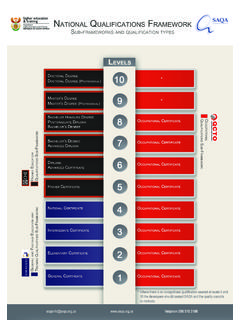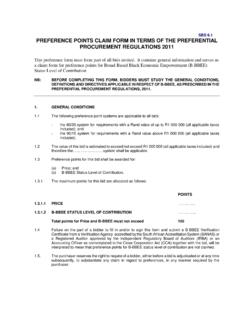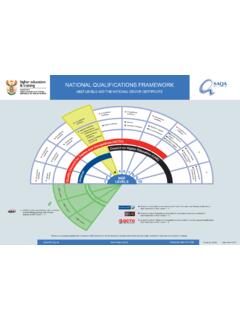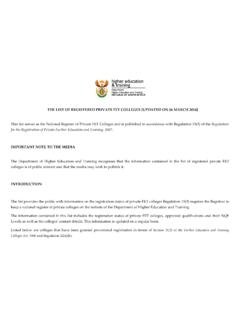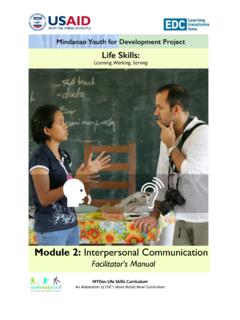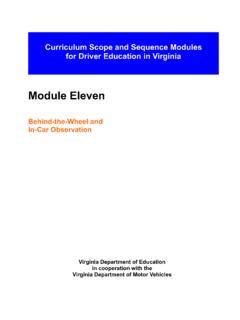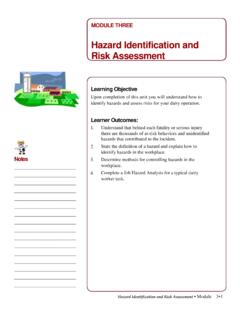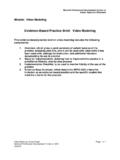Transcription of THE SOUTH AFRICAN QUALIFICATIONS AUTHORITY Level ...
1 THE SOUTH AFRICAN QUALIFICATIONS AUTHORITYL evel Descriptors for the SOUTH AFRICAN National QUALIFICATIONS FrameworkNovember 2012dCopyrightAll rights reserved. No part of this publication may be reproduced, stored in a retrieval system, or transmitted in any form or by any means, electronic, mechanical, photocopying, recording, or otherwise, without the prior written permission of the SOUTH AFRICAN QUALIFICATIONS AUTHORITY (SAQA).Compiled by Directorate: Registration and Recognition and distributed by the Directorate: Strategic Support, date: November 2012 ISBN: 978-0-9869808-9-3 Postnet Suite 248 Private Bag X06 Waterkloof0145 Helpdesk: +27 (0) 86 010 3188 Facsimile: +27 (0) 12 431 5039 Website: : of abbreviations ..1 Foreword ..2 Level Descriptors for the SOUTH AFRICAN National QUALIFICATIONS Framework.
2 3 Purpose and philosophical underpinning ..3 Definitions ..3 Contextual application of the Level descriptors ..4 Level descriptors ..5 NQF Level One ..5 NQF Level Two ..6 NQF Level Three ..6 NQF Level Four ..7 NQF Level Five ..8 NQF Level Six ..9 NQF Level Seven ..10 NQF Level Eight ..10 NQF Level Nine ..11 NQF Level Ten ..12 Review period ..13 Short title ..13 List of abbreviationsNQF National QUALIFICATIONS FrameworkRPL Recognition of Prior LearningSAQA SOUTH AFRICAN QUALIFICATIONS Authority2 The Level Descriptors were developed by SAQA and agreed to by the Quality Councils (Council on Higher Education; General and Further Education and Training Quality Council (Umalusi) and the Quality Council for Trades and Occupations).
3 They were published in the government gazette in November 2011. Their primary focus is QUALIFICATIONS experts who are involved in developing and implementing the SOUTH AFRICAN NQF. Others who will benefit from the Level Descriptors are the users including learners and skills development practitioners. The Level Descriptors focus on the challenges involved in taking the objectives of the NQF forward at national NQF Act, No 67 of 2008, makes provision for a ten- Level framework where levels of learning achievement are arranged in ascending order from one to ten. One of the ways through which SAQA aims to advance the objectives of the NQF, in establishing a single integrated national framework for learning achievement, is the Level important purpose of the Level Descriptors is to support the design and implementation of QUALIFICATIONS and part QUALIFICATIONS within the NQF.
4 They have been designed to contribute to coherence in learning achievement and facilitate evaluation criteria for comparability and thus articulation within the Councils, who recommend QUALIFICATIONS for registration on the NQF, must use the NQF Level Descriptors as a key reference in a transparent Level Descriptors reflect a broad agreement on the potential benefits of the SOUTH AFRICAN NQF for promoting lifelong learning. Joe SamuelsChief Executive OfficerSAQAF oreword3 Purpose and philosophical underpinning1. The purpose of Level descriptors for levels One to Ten of the National QUALIFICATIONS Framework is to ensure coherence in learning achievement in the allocation of QUALIFICATIONS and part QUALIFICATIONS to particular levels , and to facilitate the assessment of the national and international comparability of QUALIFICATIONS and part In order to advance the objectives of the NQF, the SOUTH AFRICAN QUALIFICATIONS AUTHORITY is responsible for the development of the content of the Level descriptors for each Level of the NQF in agreement with the three Quality Councils.
5 The Council on Higher Education, Umalusi and the Council for Trades and The philosophical underpinning of the National QUALIFICATIONS Framework and the Level descriptors is applied competence, which is in line with the outcomes-based theoretical framework adopted in the SOUTH AFRICAN context. 4. Ten categories are used in the Level descriptors to describe applied competencies across each of the ten levels of the National QUALIFICATIONS Framework: Scope of knowledge Knowledge literacy Method and procedure Problem solving Ethics and professional practice Accessing, processing and managing information Producing and communicating of information Context and systems Management of learning 5. In these Level descriptors any word or expression to which a meaning has been assigned in the National QUALIFICATIONS Framework Act (Act 67 of 2008) shall have such meaning unless the context indicates otherwise.
6 A basic set of definitions is given below, while further definitions and help in the interpretation of particular words or phrases used in the Level descriptors are given in separate guidelines which will be developed by each of the Quality Applied competence has three constituent elements: foundational competence embraces the intellectual/academic skills of knowledge together with analysis, synthesis and evaluation, which includes information processing and problem solving; practical competence includes the concept of operational context; and reflexive competence incorporates learner Field means a particular area of learning used as an organising mechanism for the Descriptors for the SOUTH AFRICAN National QUALIFICATIONS Framework48. Level means one of the series of levels of learning achievement arranged in ascending order from one to ten according to which the NQF is organised and to which qualification types are Level descriptor means that statement describing learning achievement at a particular Level of the NQF that provides a broad indication of the types of learning outcomes and assessment criteria that are appropriate to a qualification at that National QUALIFICATIONS Framework is a comprehensive system approved by the Minister for the classification, registration, publication and articulation of quality assured national Sub-framework means one of three coordinated QUALIFICATIONS sub-frameworks which make up the NQF as a single integrated system.
7 The Higher Education QUALIFICATIONS Sub-Framework, the General and Further Education and Training Sub-Framework and the Occupational QUALIFICATIONS application of the Level descriptors 12. The following principles underpin the application of the Level descriptors across the three sub-frameworks of the NQF: There is one common set of Level descriptors for the NQF to be used in different contexts The Level descriptors incorporate ten competencies The Level descriptors are designed to meet the needs of academic as well as occupational QUALIFICATIONS There must be correlation between qualification levels and occupational levels in the world of work The Critical Cross-Field Outcomes of SAQA are embedded in the Level descriptors Level descriptors are cumulative there is progression in the competencies from one Level to the next Level descriptors are applicable to the Recognition of Prior Learning (RPL)
8 Level descriptors are descriptive and not prescriptive The nomenclature for QUALIFICATIONS is dealt with in the sub-frameworks of the Level descriptors embrace learning in a wide variety of contexts (vocational, occupational, academic and professional) and environments (classroom, laboratory, field, clinic, community, etc.). Contextual interpretation of the Level descriptors within each of the three sub-frameworks across academic, professional and occupational contexts is encouraged. In this regard, separate guidelines will be developed for each Level descriptors provide a scaffold from which more specific descriptors can be developed by a variety of different sectors and practitioners, for example discipline- or profession-based. It is also recognised that in the processes of curriculum design and development, the interpretation of these generic Level descriptors will be influenced by, for example, field-, discipline- and context- specific The nomenclature for QUALIFICATIONS is dealt with in the sub-frameworks of the Level descriptors are designed to act as a guide and a starting point for, inter alia.
9 Writing learning outcomes and associated assessment criteria for QUALIFICATIONS and part qualifications5 Pegging a qualification at an appropriate Level on the NQF, used together with purpose statements, outcomes and assessment criteria Assisting learners to gain admission through RPL at an appropriate Level on the NQF Making comparisons across QUALIFICATIONS in a variety of fields and disciplines pegged at the same Level of the NQF Programme quality management, used together with purpose statements, outcomes and assessment criteria. 17. Level descriptors provide a broad indication of learning achievements or outcomes that are appropriate to a qualification at that Level . 18. The competencies listed at a particular Level in the framework broadly describe the learning achieved at that Level , but an individual learning programme may not necessarily meet each and every criterion Level descriptors do not describe years of In the Level descriptors, the accessing, analysing and managing of information and communication in terms of reading, listening and speaking will, where applicable, include Braille and sign language to accommodate learners with special needs.
10 In the case of sign language, listening and speaking refer to receptive and productive language descriptors21. The following Level descriptors describe the learning achievement at a particular Level of the NQF that provides a broad indication of the learning achievements or outcomes that are appropriate to a qualification at that Level . 22. NQF Level Onea. Scope of knowledge, in respect of which a learner is able to demonstrate a general knowledge of one or more areas or fields of study, in addition to the fundamental areas of Knowledge literacy, in respect of which a learner is able to demonstrate an understanding that knowledge in a particular field develops over a period of time through the efforts of a number of people, and often through the synthesis of information from a variety of related sources and Method and procedure, in respect of which a learner is able to demonstrate the ability to use key common tools and instruments, and a capacity to apply him/herself to a well-defined task under direct Problem solving.

